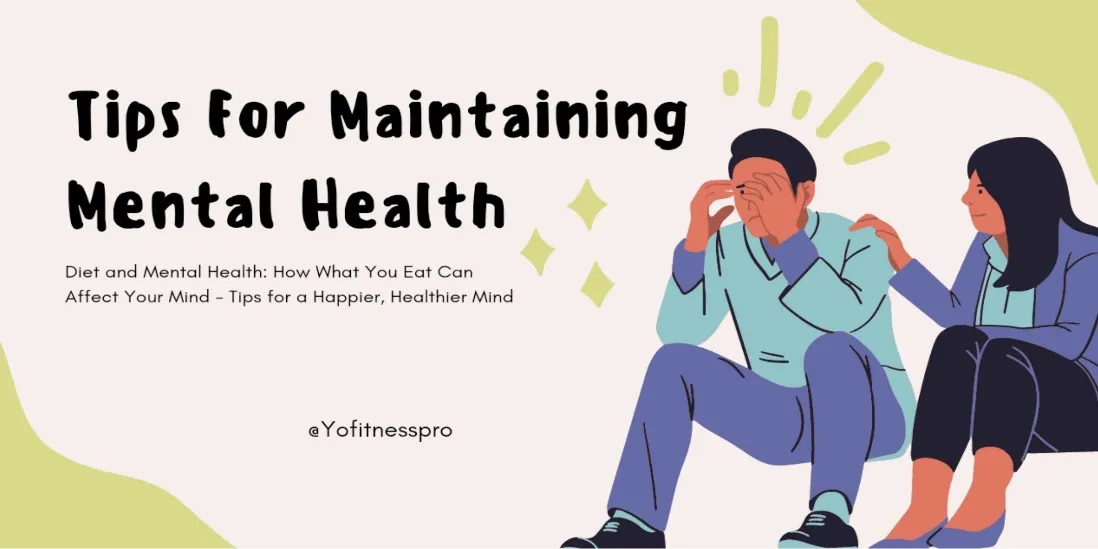Diet and Mental Health: How What You Eat Can Affect Your Mind – Tips for a Happier, Healthier Mind
When we think of taking care of our mental health, we might think of therapy, medication, or exercise. But did you know that what you eat can also have a significant impact on your mood, cognition, and overall mental well-being?
Studies have shown that certain dietary patterns and nutrients can influence the risk and severity of various mental health disorders, including depression, anxiety, and dementia. In this article, we’ll explore some of the ways in which diet and mental health are connected, and give you some tips on how to eat for a happier, healthier mind.
The Link Between Diet and Mental Health
The brain is one of the most metabolically active organs in the body, and it requires a steady supply of nutrients to function optimally. Research has shown that deficiencies or imbalances in certain nutrients can contribute to the development or exacerbation of mental health conditions.
For example, studies have found that people with depression tend to have lower levels of certain nutrients, such as omega-3 fatty acids, vitamin D, and B vitamins, than people without depression. Similarly, people with anxiety disorders may have lower levels of magnesium and zinc, both of which are important for regulating the stress response.
On the other hand, some dietary patterns have been associated with lower risk of mental health disorders. For instance, a Mediterranean-style diet, which emphasizes whole grains, fruits, vegetables, nuts, legumes, fish, and healthy fats, has been shown to reduce the risk of depression and cognitive decline.
Tips for improve your mental health through your diet.
Here are some tips to improve your mental health through your diet:
Eat a Balanced Diet
First and foremost, aim for a balanced diet that includes a variety of nutrient-dense foods. This means eating plenty of fruits and vegetables, whole grains, lean proteins, and healthy fats, while limiting your intake of processed and sugary foods.
Prioritize Omega-3 Fatty Acids
Omega-3 fatty acids are a type of healthy fat that are crucial for brain health. They’re found in fatty fish like salmon, sardines, and mackerel, as well as in walnuts, flaxseed, and chia seeds. Studies have shown that omega-3s can reduce inflammation in the brain and improve mood, memory, and cognitive function.
Get Enough Vitamin D
Vitamin D is known as the “sunshine vitamin” because our bodies can synthesize it when we’re exposed to sunlight. However, many people don’t get enough vitamin D from the sun alone, especially in the winter months. Low levels of vitamin D have been linked to depression and other mental health problems. Good food sources of vitamin D include fatty fish, egg yolks, and fortified foods like milk and cereal.
Include Probiotics and Fermented Foods
The gut-brain connection is a hot topic in neuroscience, and research has shown that the health of our gut microbiome (the community of bacteria in our digestive tract) can influence our mental health. Probiotics, which are live bacteria that promote a healthy gut microbiome, can be found in supplements or in fermented foods like yogurt, kefir, kimchi, and sauerkraut.
Reduce Inflammatory Foods
Inflammation is a natural process in the body that helps us fight off infections and heal injuries. However, chronic inflammation has been linked to a variety of health problems, including mental health disorders. Certain foods, such as refined sugars, saturated and trans fats, and processed meats, can promote inflammation in the body. Try to limit your intake of these foods and focus on anti-inflammatory options like fruits, vegetables, whole grains, and healthy fats like olive oil and nuts.
Limit Caffeine and Alcohol
While a cup of coffee or a glass of wine can be enjoyable, consuming too much caffeine or alcohol can have negative effects on mental health. Caffeine can increase anxiety and disrupt sleep, while excessive alcohol consumption can lead to depression, memory problems, and other mental health issues. If you choose to consume caffeine or alcohol, do so in moderation.
Consider Supplements
While it’s always best to get your nutrients from whole foods, supplements can be a useful addition to your diet if you’re not able to get enough through food alone. Some supplements that may be helpful for mental health include omega-3 fish oil, vitamin D, magnesium, and B vitamins.
Read This–
- A Low Carb Diet For Beginners
- The Sleep Diet: How Your Food Choices Affect Your Sleep Quality
- Transform Your Life with Healthy Lifestyle, Diet, and Nutrition Habits
Conclusion
what you eat can have a significant impact on your mental health. Eating a balanced diet that includes plenty of nutrient-dense foods, prioritizes omega-3 fatty acids, and includes probiotics and fermented foods can help support a healthy mind. Meanwhile, reducing your intake of inflammatory foods, limiting caffeine and alcohol, and considering supplements can further support your mental health.
Remember that everyone’s dietary needs are different, and it’s important to work with a healthcare professional to determine what’s best for you. By taking care of your diet, you can support a happier, healthier mind.
By following these tips, you can support your mental health through your diet. Remember that small changes can make a big difference, and it’s never too late to start taking care of your mind and body. If you’re struggling with a mental health condition, don’t hesitate to seek help from a qualified professional. Together, you can develop a holistic treatment plan that includes diet, exercise, therapy, and medication if necessary.
